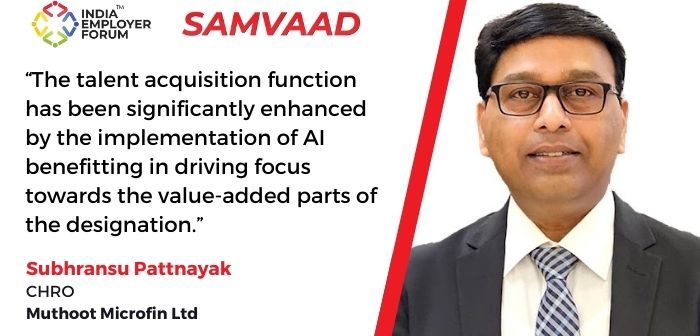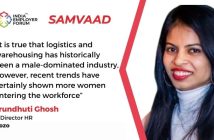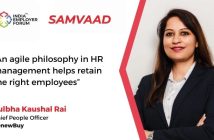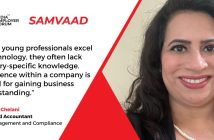Subhransu Pattnayak, CHRO at Muthoot Microfin Ltd., speaks to India Employer Forum about AI impacting recruitment in the BFSI industry, finding skilled talent, upskilling and reskilling initiatives, and more.
Q. How is AI impacting recruitment and talent acquisition in the BFSI industry, and what changes are being observed in the types of skills and profiles sought?
The Banking, financial services and insurance (BFSI) industry is enduring an inevitable digital renovation side by side to its operations to broaden the horizons of secure financial services to its customers. The talent acquisition function has been significantly enhanced by the implementation of AI benefitting in driving focus towards the value-added parts of the designation. Quality and productivity stand as prominent factors in the scope of AI; as it provides a list of candidates with needed competencies in a matter of time. The AI-implemented assessments, tracking mechanism that prioritises open job requisitions, and considerable removal of regrettable hires from the picture makes AI reliable. Dehumanising the recruitment process, however, has its flaws. AI functions based on inputs and are unable to connect with the audience. While interdisciplinary academic backgrounds are removed by AI due to the inputs, AI chatbots are also not helpful for bringing up irrelevant contexts while responding to queries. AI might struggle to reach a mutually exclusive business goal in the present scenario about talent acquisition in the BFSI industry.
Q. Is your organisation facing challenges in finding qualified talent to meet its needs, and what strategies are being implemented to attract skilled talent in a competitive market?
Talent acquisition is a function that requires quite a lot of time and energy. Our organisation promotes multiculturalism and inclusiveness. A candidate who aspires to join us must possess assertiveness and empathy while getting acquainted with the culture and ethics that we share. It isn’t difficult to drive competent candidates with professional backgrounds towards us. We offer them a space to grow; unlearn and learn differently. We keep up with the trends in the job market and the driving forces of societal change when a potential candidate approaches us. The organisation welcomes narratives and perspectives that help in mutual empowerment. Great minds think alike, and we hold our heads high to say that thinking about the future as a collectivity brought us to what we are today.
Q. With the increasing demand for specialised technical skills in the industry, how is the organisation advancing upskilling and reskilling initiatives for its workforce?
The sense of lack creates demand. The goal is to identify the potential ‘lacks’ before it moves on to the advanced stage called “demand”. Our organisation conducts monthly reviews of the performance of our employees. The HR team is well-updated with the technological advancements in the fields; especially in AI and EI (Emotional Intelligence). Curating orientation and training programs on skill development for new and existing employees, as needed, helps refresh the panorama of work. Sessions on the newly introduced software and legal amendments are another initiative to keep the team on track of progress. External certified trainers conduct quarterly Employee Orientation Programs and help the team train for the flow of events to follow. Residential Training Programs are connected annually and employees are recognised and rewarded for their top-notch services in their respective fields. The feedback on the employment experience is treated with substantial value and is actively responded to in a matter of time. We expect our employees to have insights into every activity running in the organisation so that they can step up in their career and job transcendence. The organisation has integrated skill development lectures from the best International Universities into its LMS for the employees to access and learn from at their preferred time and space.
Q. Would the future world of work need radically different skill sets and how do we groom the workforce to develop the requisite skills for a seamless transition into the changing world of work?
Software such as ChatGPT entered the picture and was the talk of the town for a while until several other AI software and updates introduced swiftness in getting work completed, with unbelievable precision. The future world of work will keep time as the most precious factor. AI has been replacing manpower because of its efficiency. Critical thinking, decision-making, leadership, management and data analysis based on cultural and geographical field exposure are areas that machines cannot overpower. The world will require employees to sharpen their mindfulness in actions and spoken words. Employee exchange programs and inter-departmental skill development programs support them to think advanced and rationally while staying updated about regional norms.
Q. India’s insurance sector has immense potential for investors as it is one of the booming markets. What are your views on IRDAI’s vision of ‘Insurance for All by 2047’ under the Government of India’s Insurance inclusion plan?
India needs an inclusive and accessible insurance sector and IRDAI is bridging the gap by introducing affordable health, life, and property insurance. IRDAI ensures awareness about its benefits and helps businesses get appropriate coverage. It promotes inclusivity and entrepreneurship. With various initiatives recognised by the government and other regulatory bodies, IRDAI is revolutionising the efficiency of home-grown businesses one step at a time.
About Subhransu Pattnayak
As the Chief Human Resource Officer at Muthoot Microfin Ltd, Subhransu Pattnayak leads and oversees the overall Human Resource strategy and operations for Pan-India with more than 15,000 employees. He has more than 12 years of experience in the HR domain, with 22 years of total Experience, where he has successfully managed and developed human resources across diverse geographies, verticals, and units.
His core competencies include resource management and development, planning and budgeting, talent acquisition, learning and organisational development, statutory compliance, employee engagement.As an HR leader, he is deeply committed to employee well-being , health and safety. He is also an MBA graduate with certifications in emotional intelligence and HR analytics, which enable him to inspire, empower, and support his team and the organisation in achieving their goals and objectives. Subhransu is passionate about creating a great place to work, fostering a culture of innovation and excellence, and enhancing the social impact of the MFI sector. You can connect with him here.




